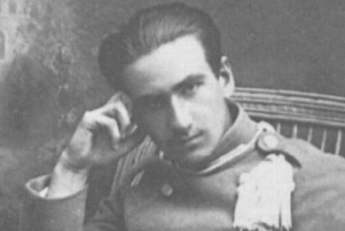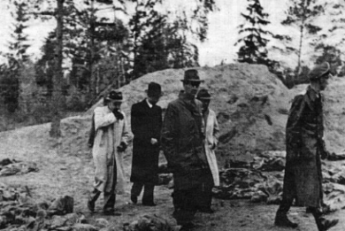
Józef Mackiewicz about Witold Gombrowicz
The relationship between Józef Mackiewicz and Witold Gombrowicz, one of the greatest Polish writers of the 20th century, developed during the emigration period. Mackiewicz’s writing talent was also recognized by Gombrowicz, who, as we know, rarely appreciated anyone but himself. In a letter to the editor-in-chief of the “Kultura” monthly in 1958, Gombrowicz wrote: “If I were America, I would finance three writers: Miłosz, Mackiewicz (Józef), Gombrowicz.”
For Mackiewicz, Witold Gombrowicz was synonymous with everything that he did not accept in literary works. As early as 1960, he was critical of the artistic shape of the works of the writer, who was still in Argentina at the time:
“You can hide the most banal thoughts under the touch of style, but they will not appear trivial or naive. […] Why there is such a fashion, the devil knows. But it reigns. Without mentioning some of our writers by name, I often ask myself: “Why doesn’t a man write like a man, but like Gombrowicz!”.
In 1963, Mackiewicz noticed clear egocentric (and perhaps megalomaniacal) accents in the personality of his fellow writer: “Not being a Gombrowicz, I do not attribute to myself not only the first, but also the thousandth role in the nation.”
In 1969, in an extensive review of Marian Hemar’s Arguments in the Family, Mackiewicz included a fragment parodying the stylistic manner characteristic of Witold Gombrowicz’s Diary. The purpose of this procedure was to contrast the two poetics and to criticize the “obfuscation of the form”, “which is considered to be the contemporary avant-garde”. Here’s an excerpt from that parody:
Me, me, me, me and me, who is the only poet suffocating in the intensity of his own genius. I am simplifying the general panorama, and yet I had the eloquence of the fact under my thumb. What to do, what to do, what to do? Break off! Distance! let out. Give me a knife, I want to cut off the excess of my own genius. Azalea. History has put me on top of a mountain. Alleluia. Enough. […] How easy it is! I. boom! You just have to recognize my talent.”
Gombrowicz replied with a polemic: “But what to do when Mr. Józef Mackiewicz exclaims (no. 1144 “Wiadomości”), mocking my texts. Oh, look at him, megalomaniac, snob, muddling the water to create the appearance of artificial depth! He accosted me. I answer.”.
By polemicizing, he emphasizes his own uniqueness – especially visible in the last sentences: “Schopenhauer said that the mind of an ordinary person is like a pocket flashlight that illuminates only what you are looking for (e.g. I go into the pantry and look for prunes). And the mind of a man of genius, says Schopenhauer, is like the sun, which illuminates everything objectively and fairly. I wish Mr Mackiewicz such genius. And also the idea of emigration in general.
Mackiewicz speculates that, according to him, Gombrowicz was “definitely overrated” and I argue this thesis. “The source of this discount was the great publicity that Gombrowicz was able to earn in the international spheres of the literary establishment, i.e. cronyism supported by certain American circles, the so-called avant-garde. […] So he used a trick used by painters who cannot paint and have nothing to paint: hiding the content, or rather the lack of it, under a form incomprehensible to the environment. The less content, the more incomprehensible the form. You just need not be afraid of the absurd. The greater the gap between understanding and the work, the greater the fool the reader turns out to be, the greater the genius of the author of the work. Because “easy” can be understood by everyone. “Difficult things” on the other hand – only the intellectual elite. It is a simple formula and this time understandable. And who wants to be a fool!” With these words, the author of “The Victory of Provocation” clearly discredits Gombrowicz, and at the same time the entire avant-garde.
“Compatriots are naturally happy with the international fame gained by a compatriot. It is, in a way, a patriotic duty, consistent in this case with innate snobbery. Hence, many writers in exile made an effort to “guess” Gombrowicz and interpret him appropriately. Mostly, they succeeded very well, because the interpretation of the content that does not exist under the external form gives the widest field to develop any own invention and own writing talent. I believe that these numerous flattering reviews about Gombrowicz are his most valuable legacy,” he wrote.
Sources:
“News”, Vol. 23 No. 18 (1153), 1968
“News”, Vol. 24 No. 40 (1227), 1969
“News”, Vol. 23 No. 9 (1144), 1968






